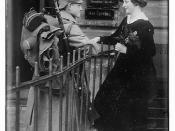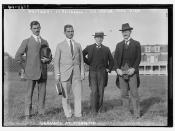The Resistance movements throughout Europe played very important roles in defeating the German military during World War Two. European Allies in the resistance movements destroyed German communication lines, gathered intelligence for the Allies, and would openly attack German soldiers. The resistance movements were found in all German occupied countries, and they were a vital part in the fall of the German army.
The devastating Blitzkrieg attacks of 1939 to 1941, which took in Poland, Norway, Western Europe and Russia, had given little time for each country to prepare a secret army to undermine the Germans. The Germans didn't think that the resistance movements would gain support, because they believed that the people were scared of the cruelty that the Germans had shown the local people and that they would second guess any decision to join the resistance movements. In fact, groups in all German occupied countries would support resistance movements in some way.
June 6th 1944 was one of the major events of World War Two, it was known as D-Day. D-Day had lots of support; the allied armada sent over 100,000's of soldiers to the shores of Normandy at the start of the drive to Berlin. In 1943, the planning for D-Day began, the planned invasion was given the code-word "overlord". The Allies had learned that the Germans had expected an allied attack at the nearest point to occupied Europe, so the allies planned to attack from the beaches of Normandy. Intelligence reports had shown that the Normandy region wasn't as heavily defended as the other regions. The length of the sea crossing made it an unlikely landing spot for the Allies and that is what the Allies hoped the Germans thought as well. The allies started to survey the beach secretly so that could find out where the...


![[German vehicle tax registration issued to George Grantham Bain] (LOC)](https://s.writework.com/uploads/6/60390/german-vehicle-tax-registration-issued-george-grantham-bain-thumb.jpg)
Lacking.
Not sure how you can effectively discuss resistance movements without clear reference to the partisans in Italy or Greece or the maquis in France. As it is, far too short a discussion for such a topic.
0 out of 3 people found this comment useful.